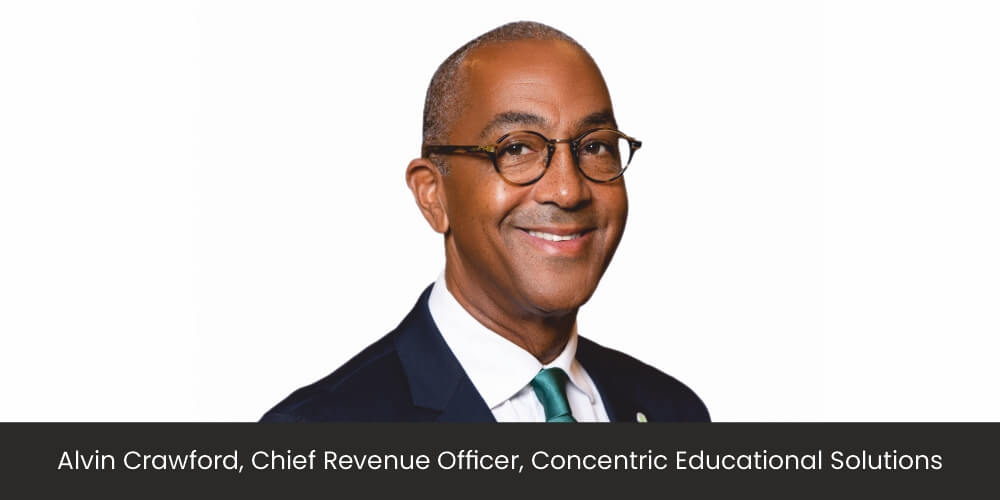Alvin Crawford is the Chief Revenue Officer at Concentric Educational Solutions, bringing a wealth of experience and expertise to the education sector. With a career spanning over two decades, Alvin Crawford has established himself as a thought leader, strategist, and innovator in the field. Alvin Crawford impressive track record includes leading teams that have collectively generated over $750 million in sales, primarily within urban districts and state education markets. His contributions have made a significant impact on the industry, and he continues to drive positive change within the realm of education.
Below are highlights of the interview:
What inspired you to work in the educational field, and how has your passion for education evolved over the years?
After business school in the late 90s, I worked for interactive agencies, providing Fortune 50 consulting on internet strategies. In 1999, I was drawn into K–12 education by my colleague Jonathan Harber, the founder of SchoolNet. I joined his edtech startup in 2000, driven by the goal of doing well by doing good. My background includes a teacher mother and a pioneering orthopedic surgeon father, leading to a childhood filled with frequent relocations and experiences of educational inequity.
My initial role at SchoolNet involved data-driven decision-making for curriculum and instruction. We soon realized that the real challenges in education were not the students but the adults in the system. This led us to focus on human capital management.
After a decade at SchoolNet, I became CEO of Knowledge Delivery Systems, which provided online professional development for teachers. We aimed to scale effective practices across school districts, fostering collaboration and knowledge sharing.
My journey revealed that school systems face numerous challenges, often requiring change management and substantial support. Alvin Crawford tend to be risk-averse, opening opportunities for companies like Public Consulting Group (PCG) to address complex issues.
I was enticed away from PCG to join Revolution Foods, a healthy school meal company, after a moving speech by a friend who shared his inspiring journey from homelessness to education. This experience highlighted the importance of school meal programs.
Now, I’m excited about my role at Concentric Educational Solutions. We focus on supporting students, engaging their families, and addressing chronic absenteeism, which has grown to 25% since the pandemic. Our work includes coaching, mentoring, and tutoring. We hire college graduates from similar communities to empower children and build trust with families. We are even developing a teacher pipeline program to place our employees in teaching roles.
Throughout my journey, my commitment to education deepened. I’ve witnessed school systems’ desire to improve outcomes and their openness to innovative solutions.
Revenue generation in the educational sector can be unique. What strategies or approaches have you found most effective in achieving revenue growth for Concentric Educational Solutions?
Over my career in education, I have led teams that have brought in more than $750 million in revenue from K–12 school districts and states. I’m relatively new to Concentric, but the underlying principles that I am focused on are the following:
- Product Market Fit
- Selling to Value
- Identifying our customers
- Differentiation
The educational sector faces various challenges and opportunities. How do you navigate the balance between addressing educational challenges and seizing opportunities to enhance learning experiences?
Addressing the needs in the education sector is tough, especially if you’re selling into school systems and states. I have found that the key is understanding how complex sales work, learning about stakeholder development, and ensuring product-market fit. In most scenarios, despite their best efforts, districts don’t always have a holistic view of the available solutions and how they fit together. So much of the work is in product market fit and having clear positioning and differentiation so that decision-makers understand our value and how you play with the other solutions already in place.
Can you provide insights into how technology and innovation play a role in addressing these challenges and opportunities?
If you’re not innovating and using technology to solve problems, my presumption is that you’re in an industry in decline. We’re constantly looking at how to leverage technology and innovation to better support customer needs. Today, we’re doing data collection and reporting to help districts understand why families aren’t coming to school and capturing all of the touch points with tutors and mentors in the school building so that we can determine the most effective practices to help students thrive. We’re looking at new innovations and continuing to look at where AI can help us gain deeper insights into helping our students improve.
Looking ahead, what trends or developments do you anticipate in the field of education, and how does Concentric Educational Solutions plan to adapt and excel in this dynamic educational landscape?
I mentioned AI, but there are many ways to help school systems. We recently launched a teacher pipeline solution. Since we hire hundreds of young people every year to work with school systems, we will help districts solve the teacher pipeline problem by getting students their master’s degree in teaching while they work with students and families. It addresses a huge pain point for districts, and it aligns nicely with our business model.
What excites you the most about the future of education and revenue generation, and how do you envision your role in shaping this future?
Doing well by doing good has always been a core part of my life in K–12 education. My former boss, Kris Richmond, always used to say, “No Margin, No Mission.” So I live the duality of doing great work that impacts outcomes for our clients while ensuring that our clients are clear on the value that we provide and willing to pay for it. It’s exciting to know that there are meaningful solutions out there that directly impact students’ lives. With my intimate knowledge of selling to school districts, I feel like my job is really about helping the systems that are ready to do the work be transformative. Every district isn’t ready to be transformative. There are lots of other priorities in some cases. I love identifying those who are ready to be transformative and helping them with the work.
As a Chief Revenue Officer, your leadership is crucial. How do you foster a culture of collaboration, innovation, and growth within your organization and among your teams?
Culture is at the center of all of our work. Teams need to know that the work they do on a daily basis has a purpose and that, strategically, we have a shared mission and purpose for the work that we do. Unfortunately, it isn’t just about the impact that we’re having in schools and with children. Sometimes purpose is about how the oars are rowing in the same direction. Or how the company as a whole is working in more effective and efficient ways because we’re focused in how we sell, how we execute, and what’s being asked of our teams.
Alvin Crawford, My goal is always to align solutions to customer needs, sell solutions that are both impactful and effective to implement with fidelity, ensure that we are aligned to our customer’s needs, demonstrate strategically that we’re helping them meet those needs, and internally, keep pace with what the organization can manage so that growth is steady and predictable. There is an internal need as well, which is to make sure that we are selling to value, which leads to increasing and maintaining profitability.
Website: Concentric Educational Solutions





